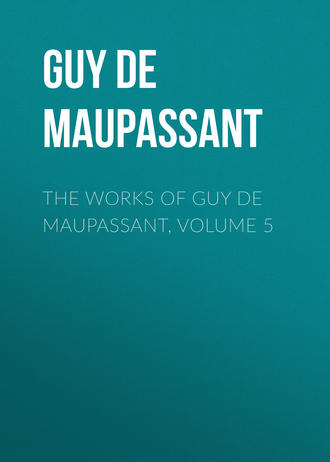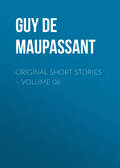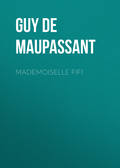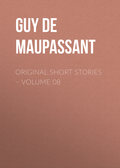
Ги де Мопассан
The works of Guy de Maupassant, Volume 5
VIII
Rosalie had left the house and the time of Jeanne's confinement was drawing near. The sorrow she had gone through had taken away all pleasure from the thought of becoming a mother, and she waited for the child's birth without any impatience or curiosity, her mind entirely filled with her presentiment of coming evils.
Spring was close at hand. The bare trees still trembled in the cold wind, but, in the damp ditches, the yellow primroses were already blossoming among the decaying autumn leaves. The rain-soaked fields, the farm-yards and the commons exhaled a damp odor, as of fermenting liquor, and little green leaves peeped out of the brown earth and glistened in the sun.
A big, strongly-built woman had been engaged in Rosalie's place, and she now supported the baroness in her dreary walks along the avenue, where the track made by her foot was always damp and muddy.
Jeanne, low-spirited and in constant pain, leant on her father's arm when she went out, while on her other side walked Aunt Lison, holding her niece's hand, and thinking nervously, of this mysterious suffering that she would never know. They would all three walk for hours without speaking a word, and, while they were out, Julien went all over the country on horseback, for he had suddenly become very fond of riding.
The baron, his wife, and the vicomte, paid a visit to the Fourvilles (whom Julien seemed to know very well, though no one at the château knew exactly how the acquaintance had begun), and another duty call was paid to the Brisevilles, and those two visits were the only break in their dull, monotonous life.
One afternoon, about four o'clock, two people on horseback trotted up to the château. Julien rushed into his wife's room in great excitement:
"Make haste and go down," he exclaimed. "Here are the Fourvilles. They have come simply to make a neighborly call as they know the condition you are in. Say I am out but that I shall be in soon. I am just going to change my coat."
Jeanne went downstairs and found in the drawing-room a gigantic man with big, red moustaches, and a pale, pretty woman with a sad-looking face, sentimental eyes and hair of a dead gold that looked as if the sun had never caressed it. When the fair-haired woman had introduced the big man as her husband, she said:
"M. de Lamare, whom we have met several times, has told us how unwell you are, so we thought we would not put off coming to see you any longer. You see we have come on horseback, so you must look upon this simply as a neighborly call; besides, I have already had the pleasure of receiving a visit from your mother and the baron."
She spoke easily in a refined, familiar way, and Jeanne fell in love with her at once. "In her I might, indeed, find a friend," she thought.
The Comte de Fourville, unlike his wife, seemed as much out of place in a drawing-room as a bull in a china shop. When he sat down he put his hat on a chair close by him, and then the problem of what he should do with his hands presented itself to him. First he rested them on his knees, then on the arms of his chair, and finally joined them as if in prayer.
Julien came in so changed in appearance that Jeanne stared at him in mute surprise. He had shaved himself and looked as handsome and charming as when he was wooing her. His hair, just now so coarse and dull, had been brushed and sprinkled with perfumed oil till it had recovered its soft shining waves, and his large eyes, which seemed made to express nothing but love, had their old winning look in them. He made himself as amiable and fascinating as he had been before his marriage. He pressed the hairy paw of the comte, who seemed much relieved by his presence, and kissed the hand of the comtesse, whose ivory cheek became just tinged with pink.
When the Fourvilles were going away the comtesse said:
"Will you come for a ride on Thursday, vicomte?" And as Julien bowed and replied, "I shall be very pleased, madame," she turned and took Jeanne's hand, saying to her, affectionately:
"When you are well again we must all three go for long rides together. We could make such delightful excursions if you would."
Then she gracefully caught up the skirt of her riding-habit and sprang into the saddle as lightly as a bird, and her husband, after awkwardly raising his hat, leapt on his huge horse, feeling and looking at his ease as soon as he was mounted.
"What charming people!" cried Julien, as soon as they were out of sight. "We may, indeed, think ourselves lucky to have made their acquaintance."
"The little comtesse is delightful," answered Jeanne, feeling pleased herself though she hardly knew why. "I am sure I shall like her; but the husband seems a bear. How did you get to know them?"
"I met them one day at the Brisevilles," he replied, rubbing his hands together cheerfully. "The husband certainly is a little rough, but he is a true gentleman. He is passionately fond of shooting."
Nothing else happened until the end of July. Then, one Tuesday evening, as they were all sitting under the plane-tree beside a little table, on which stood two liqueur glasses and a decanter of brandy, Jeanne suddenly turned very white and put both her hands to her side with a cry. A sharp pain had shot through her and at once died away. In about ten minutes came another one, hardly so severe but of longer duration than the first. Her father and husband almost carried her indoors, for the short distance between the plane-tree and her room seemed miles to her; she could not stifle her moans, and, overpowered by an intolerable sense of heaviness and weight, she implored them to let her sit down and rest.
The child was not expected until September but, in case of accident, a horse was harnessed and old Simon galloped off after the doctor. He came about midnight and at once recognized the signs of a premature confinement. The actual pain had a little diminished, but Jeanne felt an awful deathly faintness, and she thought she was going to die, for Death is sometimes so close that his icy breath can almost be felt.
The room was full of people. The baroness lay back in an armchair gasping for breath; the baron ran hither and thither, bringing all manner of things and completely losing his head; Julien walked up and down looking very troubled, but really feeling quite calm, and the Widow Dentu, whom nothing could surprise or startle, stood at the foot of the bed with an expression suited to the occasion on her face.
Nurse, mid-wife and watcher of the dead, equally ready to welcome the new-born infant, to receive its first cry, to immerse it in its first bath and to wrap it in its first covering, or to hear the last word, the last death-rattle, the last moan of the dying, to clothe them in their last garment, to sponge their wasted bodies, to draw the sheet about their still faces, the Widow Dentu had become utterly indifferent to any of the chances accompanying a birth or a death.
Every now and then Jeanne gave a low moan. For two hours it seemed as if the child would not be born yet, after all; but about daybreak the pains recommenced and soon became almost intolerable. As the involuntary cries of anguish burst through her clenched teeth, Jeanne thought of Rosalie who had hardly even moaned, and whose bastard child had been born without any of the torture such as she was suffering. In her wretched, troubled mind she drew comparisons between her maid and herself, and she cursed God Whom, until now, she had believed just. She thought in angry astonishment of how fate favors the wicked, and of the unpardonable lies of those who hold forth inducements to be upright and good.
Sometimes the agony was so great that she could think of nothing else, her suffering absorbing all her strength, her reason, her consciousness. In the intervals of relief her eyes were fixed on Julien, and then she was filled with a mental anguish as she thought of the day her maid had fallen at the foot of this very bed with her new-born child – the brother of the infant that was now causing her such terrible pain. She remembered perfectly every gesture, every look, every word of her husband as he stood beside the maid, and now she could see in his movements the same ennui, the same indifference for her suffering as he had felt for Rosalie's; it was the selfish carelessness of a man whom the idea of paternity irritates.
She was seized by an excruciating pain, a spasm so agonizing that she thought, "I am going to die! I am dying!" And her soul was filled with a furious hatred; she felt she must curse this man who was the cause of all her agony, and this child which was killing her. She strained every muscle in a supreme effort to rid herself of this awful burden, and then it felt as if her whole inside were pouring away from her, and her suffering suddenly became less.
The nurse and the doctor bent over her and took something away; and she heard the choking noise she had heard once before, and then the low cry of pain, the feeble whine of the new-born child filled her ears and seemed to enter her poor, exhausted body till it reached her very soul; and, in an unconsciousness movement she tried to hold out her arms.
With the child was born a new joy, a fresh rapture. In one second she had been delivered from that terrible pain and made happier than she had ever been before, and she revived in mind and body as she realized, for the first time, the pleasure of being a mother.
She wanted to see her child. It had not any hair or nails, for it had come before its time, but when she saw this human larva move its limbs and open its mouth, and when she touched its wrinkled little face, her heart overflowed with happiness, and she knew that she would never feel weary of life again, for her love for the atom she held in her arms would be so absorbing that it would make her indifferent to everything else.
From that time her child was her chief, her only care, and she idolized it more, perhaps, because she had been so deceived in her love and disappointed in her hopes. She insisted on having the cot close to her bed, and, when she could get up, she sat by the window the whole day rocking the cradle with her foot. She was even jealous of the wet-nurse, and when the hungry baby held out its arms and mouth towards the big blue-veined breast, she felt as if she would like to tear her son from this strong, quiet peasant woman's arms, and strike and scratch the bosom to which he clung so eagerly.
She embroidered his fine robes herself, putting into them the most elaborate work; he was always surrounded by a cloud of lace and wore the handsomest caps. The only thing she could talk about was the baby's clothes, and she was always interrupting a conversation to hold up a band, or bib, or some especially pretty ribbon for admiration, for she took no notice of what was being said around her as she turned and twisted some tiny garment about in her hands, and held it up to the light to see better how it looked.
"Don't you think he will look lovely in that?" she was always asking, and her mother and the baron smiled at this all-absorbing affection; but Julien would exclaim, impatiently, "What a nuisance she is with that brat!" for his habits had been upset and his overweening importance diminished by the arrival of this noisy, imperious tyrant, and he was half-jealous of the scrap of humanity who now held the first place in the house. Jeanne could hardly bear to be away from her baby for an instant, and she even sat watching him all night through as he lay sleeping in his cradle. These vigils and this continual anxiety began to tell upon her health. The want of sleep weakened her and she grew thinner and thinner, until, at last, the doctor ordered the child to be separated from her.
It was in vain that she employed tears, commands and entreaties. Each night the baby slept with his nurse, and each night his mother rose from her bed and went, barefooted, to put her ear to the keyhole and listen if he was sleeping quietly. Julien found her there one night as he was coming in late from dining at the Fourvilles, and after that she was locked into her room every evening to compel her to stay in bed.
The child was to be named Pierre Simon Paul (they were going to call him Paul) and at the end of August he was christened, the baron being godfather, and Aunt Lison godmother. At the beginning of September Aunt Lison went away, and her absence was as unnoticed as her presence had been.
One evening, after dinner, the curé called at the château. There seemed an air of mystery about him, and, after a few commonplace remarks, he asked the baron and baroness if he could speak to them in private for a few moments. They all three walked slowly down the avenue talking eagerly as they went, while Julien, feeling uneasy and irritated at this secrecy, was left behind with Jeanne. He offered to accompany the priest when he went away, and they walked off towards the church where the angelus was ringing. It was a cool, almost cold, evening, and the others soon went into the house. They were all beginning to feel a little drowsy when the drawing-room door was suddenly thrown open and Julien came in looking very vexed. Without stopping to see whether Jeanne was there or not, he cried to the baron, as soon as he entered the room:
"Upon my soul you must be mad to go and give twenty thousand francs to that girl!"
They were all taken too much by surprise to make any answer, and he went on, too angry to speak distinctly: "I can't understand how you can be such fools! But there I suppose you will keep on till we haven't a sou left!"
The baron, recovering himself, a little, tried to check his son-in-law:
"Be quiet!" he exclaimed. "Don't you see that your wife is in the room?"
"I don't care if she is," answered Julien, stamping his foot. "Besides, she ought to know about it. It is depriving her of her rightful inheritance."
Jeanne had listened to her husband in amazement, utterly at a loss to know what it was all about:
"Whatever is the matter?" she asked.
Then Julien turned to her, expecting her to side with him, as the loss of the money would affect her also. He told her in a few words how her parents were trying to arrange a marriage for Rosalie, and how the maid's child was to have the farm at Barville, which was worth twenty thousand francs at the very least. And he kept on repeating:
"Your parents must be mad, my dear, raving mad! Twenty thousand francs! Twenty thousand francs! They can't be in their right senses! Twenty thousand francs for a bastard!"
Jeanne listened to him quite calmly, astonished herself to find that she felt neither anger nor sorrow at his meanness, but she was perfectly indifferent now to everything which did not concern her child. The baron was choking with anger, and at last he burst out, with a stamp of the foot:
"Really, this is too much! Whose fault is it that this girl has to have a dowry? You seem to forget who is her child's father; but, no doubt, you would abandon her altogether if you had your way!"
Julien gazed at the baron for a few moments in silent surprise. Then he went on more quietly:
"But fifteen hundred francs would have been ample to give her. All the peasant-girls about here have children before they marry, so what does it matter who they have them by? And then, setting aside the injustice you will be doing Jeanne and me, you forget that if you give Rosalie a farm worth twenty thousand francs everybody will see at once that there must be a reason for such a gift. You should think a little of what is due to our name and position."
He spoke in a calm, cool way as if he were sure of his logic and the strength of his argument. The baron, disconcerted by this fresh view of the matter, could find nothing to say in reply, and Julien, feeling his advantage, added:
"But fortunately, nothing is settled. I know the man who is going to marry her and he is an honest fellow with whom everything can yet be satisfactorily arranged. I will see to the matter myself."
With that he went out of the room, wishing to avoid any further discussion, and taking the silence with which his words were received to mean acquiescence.
As soon as the door had closed after his son-in-law, the baron exclaimed:
"Oh, this is more than I can stand!"
Jeanne, catching sight of her father's horrified expression, burst into a clear laugh which rang out as it used to do whenever she had seen something very funny:
"Papa, papa!" she cried. "Did you hear the tone in which he said 'twenty thousand francs!'"
The baroness, whose smiles lay as near the surface as her tears, quivered with laughter as she saw Jeanne's gayety, and thought of her son-in-law's furious face, and his indignant exclamations and determined attempt to prevent this money, which was not his, being given to the girl he had seduced. Finally the baron caught the contagion and they all three laughed till they ached as in the happy days of old. When they were a little calmer, Jeanne said:
"It is very funny, but really I don't seem to mind in the least what he says or does now. I look upon him quite as a stranger, and I can hardly believe I am his wife. You see I am able to laugh at his – his want of delicacy."
And the parents and child involuntarily kissed each other, with smiles on their lips, though the tears were not very far from their eyes.
Two days after this scene, when Julien had gone out for a ride, a tall, young fellow of about four or five-and-twenty, dressed in a brand-new blue blouse, which hung in stiff folds, climbed stealthily over the fence, as if he had been hiding there all the morning, crept along the Couillards' ditch, and went round to the other side of the château where Jeanne and her father and mother were sitting under the plane-tree. He took off his cap and awkwardly bowed as he came towards them, and, when he was within speaking distance, mumbled:
"Your servant, monsieur le baron, madame and company." Then, as no one said anything to him he introduced himself as "Desiré Lecoq."
This name failing to explain his presence at the château, the baron asked:
"What do you want?"
The peasant was very disconcerted when he found he had to state his business. He hesitated, stammered, cast his eyes from the cap he held in his hands to the château roof and back again, and at last began:
"M'sieu l'curé has said somethin' to me about this business – " then, fearing to say too much and thus injure his own interests, he stopped short.
"What business?" asked the baron. "I don't know what you mean."
"About your maid – what's her name – Rosalie," said the man in a low voice.
Jeanne, guessing what he had come about, got up and went away with her child in her arms.
"Sit down," said the baron, pointing to the chair his daughter had just left.
The peasant took the seat with a "Thank you, kindly," and then waited as if he had nothing whatever to say. After a few moments, during which no one spoke, he thought he had better say something, so he looked up to the blue sky and remarked:
"What fine weather for this time of year to be sure. It'll help on the crops finely." And then he again relapsed into silence.
The baron began to get impatient.
"Then you are going to marry Rosalie?" he said in a dry tone, going straight to the point.
At that all the crafty suspicious nature of the Normandy peasant was on the alert.
"That depends," he answered quickly. "Perhaps I am and perhaps I ain't, that depends."
All this beating about the bush irritated the baron.
"Can't you give a straightforward answer?" he exclaimed. "Have you come to say you will marry the girl or not?"
The man looked at his feet as though he expected to find advice there:
"If it's as M'sieu l'curé says," he replied, "I'll have her; but if it's as M'sieu Julien says, I won't."
"What did M. Julien tell you?"
"M'sieu Julien told me as how I should have fifteen hundred francs; but M'sieu l'curé told me as how I should 'ave twenty thousand. I'll have her for twenty thousand, but I won't for fifteen hundred."
The baroness was tickled by the perplexed look on the yokel's face and began to shake with laughter as she sat in her armchair. Her gayety surprised the peasant, who looked at her suspiciously out of the corner of his eye as he waited for an answer.
The baron cut short all this haggling.
"I have told M. le curé that you shall have the farm at Barville, which is worth twenty thousand francs, for life, and then it is to become the child's. That is all I have to say on the matter, and I always keep my word. Now is your answer yes or no?"
A satisfied smile broke over the man's face, and, with a sudden loquacity:
"Oh, then, I don't say no," he replied. "That was the only thing that pulled me up. When M'sieu l'curé said somethin' to me about it in the first place, I said yes at once, 'specially as it was to oblige M'sieu l'baron who'd be sure to pay me back for it, as I says to myself. Ain't it always the way, and doesn't one good turn always deserve another? But M'sieu Julien comes up and then it was only fifteen 'undred francs. Then I says to myself, 'I must find out the rights o' this and so I came 'ere. In coorse I b'lieved your word, M'sieu l'baron, but I wanted to find out the rights o' the case. Short reck'nings make long friends, don't they, M'sieu l'baron?"
He would have gone on like this till dinner-time if no one had interrupted him, so the baron broke in with:
"When will you marry her?"
The question aroused the peasant's suspicions again directly.
"Couldn't I have it put down in writin' first?" he asked in a halting way.
"Why bless my soul, isn't the marriage-contract good enough for you?" exclaimed the baron, angered by the man's suspicious nature.
"But until I get that I should like it wrote down on paper," persisted the peasant. "Havin' it down on paper never does no harm."
"Give a plain answer, now at once," said the baron, rising to put an end to the interview. "If you don't choose to marry the girl, say so. I know someone else who would be glad of the chance."
The idea of twenty thousand francs slipping from his hands into someone else's, startled the peasant out of his cautiousness, and he at once decided to say "yes":
"Agreed, M'sieu l'baron!" he said, holding out his hand as if he were concluding the purchase of a cow. "It's done, and there's no going back from the bargain."
The baron took his hand and cried to the cook:
"Ludivine! Bring a bottle of wine."
The wine was drunk and then the peasant went away, feeling a great deal lighter-hearted than when he had come.
Nothing was said about this visit to Julien. The drawing up of the marriage-contract was kept a great secret; then the banns were published and Rosalie was married on the Monday morning. At the church a neighbor stood behind the bride and bridegroom with a child in her arms as an omen of good luck, and everyone thought Desiré Lecoq very fortunate. "He was born with a caul," said the peasants with a smile.
When Julien heard of the marriage he had a violent quarrel with the baron and baroness and they decided to shorten their visit at Les Peuples. Jeanne was sorry but she did not grieve as before when her parents went away, for now all her hopes and thoughts were centered on her son.







